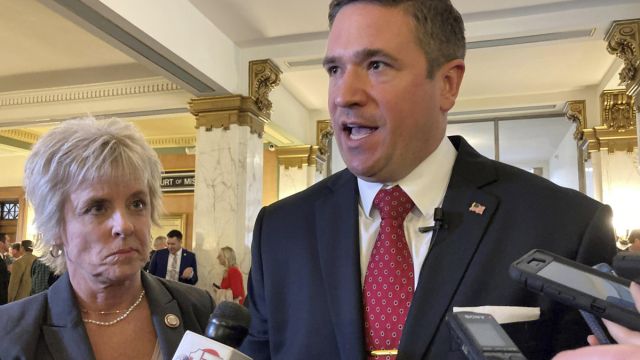Attorney General Andrew Bailey, a Republican from Missouri, is looking into the role of social workers and therapists in the Washington University Transgender Center as part of his review.
According to papers from lawsuits about the investigation, Bailey is using a broad approach to find all the medical experts, such as social workers and therapists, who are helping to push kids toward transition.
Bailey’s extensive investigation began when Jamie Reed, a former employee of the clinic, filed an affidavit last year about what she saw as the clinic’s lax rules that were used to explain letting kids go down the often irreversible medical path.
The Missouri attorney general is doing the right thing by looking into so-called gender-affirming care given by therapists and social workers, according to Dr. Stanley Goldfarb, head of the medical advocacy group Do No Harm. He told the Washington Examiner. “The investigations that are decried by these therapists and social workers are absolutely necessary in order to protect children from treatments whose profound lifelong effects they cannot possibly understand, and therefore they cannot give fully informed consent.”
Some people say that social workers and therapists play a big role in the early stages of helping transgender kids come forward, and they might even give them the idea that they might be in the wrong body.
The Missouri Independent says Bailey is looking beyond the Washington University Transgender Center to find out what other providers, like Planned Parenthood, do. He has also taken legal action against Planned Parenthood and says he wants to “eradicate” them from the Show Me State.
Bailey has long questioned whether transgender procedures like drugs and surgeries, especially for children, are effective in treating gender dysphoria. He has been backed by a rapidly growing body of medical data.
“It is now clear that most kids who think about changing their gender have serious mental health issues that need to be carefully looked at and treated by psychiatrists and psychologists who are trained to work with these kinds of kids.” That’s because social workers aren’t trained or skilled enough to properly judge these kids, Goldfarb said. “We now know from multiple systematic reviews conducted in European countries and in the recent Cass report from the United Kingdom that the evidence supporting gender transitions in children is extraordinarily weak, and treating such children with puberty blockers and with sex-altering hormones most likely harms more individuals than it possibly helps.”
Missouri banned transitional methods for kids last year, and the state let people who were hurt by them sue facilitators for malpractice. In court later this year, Bailey’s office will defend the law against a case that tries to change it.
Doctors, social workers, and other supporters of the shift have said that the law and Bailey’s investigation make it hard to do business in Missouri.
An advocacy group in Missouri called Promoting Missouri (PROMO) is led by Katy Erker-Lynch. She told the Independent that the actions of state leaders have “created a hostile environment for medical providers where they are afraid to stay and practice medicine.”
State inspectors have talked to some social workers and therapists. By the beginning of May, the Missouri Division of Professional Registration, which is in charge of medical licensing, had 16 open cases and had talked to 57 medical professionals.
In order to find out how the gender clinic worked, Bailey’s office asked for patient records to help its investigation last year. However, the clinic sued to question his right to ask for the information. Because the attorney general can’t look into charges of malpractice, Bailey used the Missouri Merchandising Practices Act to look into the clinic for false advertising. The idea behind the MMPA is to find out if doctors are telling their patients that transition can help their health in some way that hasn’t been proven or is at least doubtful based on growing medical evidence.
Lawyers for the clinic have not yet chosen whether to sue Bailey’s office, and the requests for documents have made privacy advocates worried about the patients.




